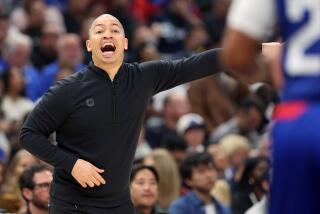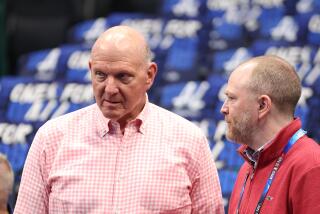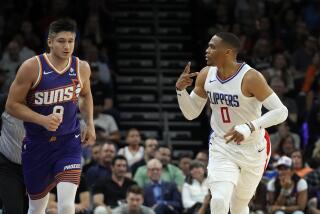CHARACTER REBUILDER : Fitch Has Turned Around Clippers and He Hasn’t Had to Mellow Out
- Share via
When Bill Fitch awoke in the recovery room after emergency triple-bypass heart surgery last summer, his first thought was that he would be continuing as coach of the Clippers.
“I don’t want to die to give up [coaching],” said Fitch, 64. “I want to be able to give it up without dying.
“When I woke up, the Lord made his decision for me. I really thought this job wasn’t finished. It was like we were only in the first or second quarter of a game.
“This is a tough place to win because it’s bound by the past,” Fitch added. “I didn’t come in with the idea that we would lose. I didn’t know how long it would take. I got the feeling that maybe it would take a lifetime.
“But the stubborn part of me came in. There was no way to say, ‘I made a mistake.’ The reason I came back was, enough people told me it just couldn’t be done. When somebody says that it makes me want to do it.”
Fitch was hired by the Clippers in 1994 and his first team promptly lost its first 16 games, then won only 17 the entire season. But he has a reputation as a master rebuilder, and his three-year plan has paid off. The Clippers, after finishing with their third-best record since moving here in 1984, are in the playoffs for the first time since 1993 and will open the first round against the Utah Jazz on Thursday night at Salt Lake City, where they have lost 14 consecutive games.
“He’s a tough-skinned guy,” Laker Coach Del Harris said of Fitch. “That’s why he’s been good at taking teams [that are] down and out and getting them into respectability. He’s a tough-minded guy. . . . He’s going to stay right in there.”
Fitch drove himself relentlessly his first two seasons with the Clippers, staying awake until dawn watching game tapes.
He began exercising and dieting after the heart attack and still follows a strict diet, but, once again, he hasn’t been getting enough sleep as he prepares the Clippers for the playoffs.
“That’s the one thing that’s come back,” he said. “I’m not getting a lot of sleep. I stay up. On the road, if I can get by with it, I’ll go to bed at 7:30 [a.m., after watching tapes of the previous night’s game]. The only difference is, I’m not killing myself eating. I don’t eat anything, I just work.”
Fitch had vowed to slow down after his heart attack and take walks on the beach near his Manhattan Beach home. But he still hasn’t seen the Pacific Ocean up close since he moved here three years ago.
“I’ll get down there and take a walk before the playoffs,” Fitch said. “I haven’t hit a golf ball since June 14 and I’m anxiously awaiting that.”
The NBA’s fourth-winningest coach with 927 victories, Fitch was the first to lose 1,000 games.
“Doing my job, you have to do a lot of losing and it affects your character,” he said. “You have to be careful that you don’t become a depressed person. I wouldn’t recommend doing what I do because you don’t enjoy life as much as you should.”
Still, Fitch is completing his 24th NBA season and he gets satisfaction from the teaching aspect of coaching.
“A coach and a teacher are synonymous,” he said. “You can’t coach if you can’t teach. You can coach for a while. I’ve seen a lot of guys come in who couldn’t teach and they were called coaches, but they learned how to teach. A couple of the old pros that came in and coached had to learn to teach and they became very good coaches.”
As both teacher and coach, however, Fitch is demanding and, sometimes, dictatorial.
“Coach isn’t the easiest coach to play for, but he’s not the hardest,” center Kevin Duckworth said. “I’d heard things about Coach Fitch before I got here, but he’s been straight up with me.
“I think he did a great job with this team. He’s very demanding and he’s to himself a lot. You can’t read his mind and you definitely can’t predict what he’s going to do, so you keep your guard up because you don’t know who’s going to start.
“But if you look at the Clippers’ past, if he wasn’t so demanding, we wouldn’t be in the playoffs now. He’s not going to pat your back every day when you do something good, but he will tell you when you do something bad.
“I’ve always learned that you work for [a coach], but you don’t have to be his friend. I don’t think he’s out to get anybody, he’s looking out for the team.”
*
Fitch, whose player rotation often seems arbitrary, has been at odds with several players this season.
“I know how to use the spurs and the whip,” Fitch said. “Most of the guys that I’ve been the toughest on are the first guys that I get Christmas cards from.”
Forward Rodney Rogers walked out of practice last month in Milwaukee when Fitch shouted obscenities at him.
Demoted after the incident, Rogers has been productive since regaining his starting spot and scored a career-high 34 points against the Houston Rockets last week.
“He’s tough to play for, but hard work always pays off,” Rogers said. “We’ve been down in games, 15 or 20 points, and wound up winning. That’s where it comes from.”
Fitch has also clashed with guard Brent Barry, reducing his playing time from 24 minutes a game last season to 10 in February. Barry, too, has become more productive and is now the Clippers’ sixth man.
“He has an old-school mentality,” Barry said. “He really doesn’t want to develop too much of a relationship with his players outside of the court because he wants them to know that he’s their mentor and teacher, and we’re the students.
“I think he’s trying to teach me things. I’m only in my second season and I think he took the approach that he wanted to put me in my place and make sure that I was still the student and not the teacher.
“He’s taught me a lot about what it means to be a professional. My situation got to the media and you guys wanted to write about it more than Lamond Murray’s or Terry Dehere’s situation. Those guys have the same type of relationship with Coach as I do. They weren’t playing and they still came to practice and worked hard and were ready any time they were called upon.”
The difference is that the Clippers used Barry, who won the 1996 NBA slam-dunk title, in their promotional material.
“That’s nothing that Coach or myself or anybody else on the team has control over,” Barry said. “That’s front-office people doing what they think is going to sell.
“I don’t know that he’s going to be my coach my whole career, but there are things that I’ve learned from him that will help me down the line. It’s all just a learning process.
“I think he’s more of a mental teacher than anything else. He tries to teach you some mental toughness and some discipline that he feels are lacking in some of the younger players.”
Fitch said he had to push Barry to make him better.
“Barry knows damn well that the reason he feels he’s being treated the way he is is not because he’s not liked,” Fitch said. “It’s because he can’t make three shots in a row or if he can’t get in shape or go five minutes without pulling on his pants.
“I’m better to Brent than Brent is to himself. I’m not hard on him. What I’ve done to Brent is nothing compared to what [Kevin] McHale went through or what [Robert] Parish went through. Had he been healthy all year [Barry sat out the first 14 games because of a thumb injury] he might have had to go through that.”
Guard Pooh Richardson, who wanted to play for the Clippers ever since he left UCLA in 1989, has spent much of the season in Fitch’s doghouse and has played in a career-low 57 games. He also was held out of a game earlier this season after criticizing Fitch.
His assessment of Fitch was guarded.
“Sometimes when you want something and you expect it and you try to do the best you can to be respected as a person and try to not be a part of jokes that they make about your organization, the same support you give them, you expect them to give you,” Richardson said. “And when you don’t receive it, it’s kind of hard.”
Richardson could get more playing time in the playoffs, as Fitch searches for the right combination to beat the Jazz, which finished with the NBA’s second-best record.
Murray, the Clippers’ No. 1 draft pick in 1994, started 61 games as a rookie, averaging 14.1 points and 4.4 rebounds. He started one game this season, averaging 7.3 points and 3.2 rebounds.
Murray complained after his playing time decreased last season, ripping Fitch in a published interview. The Clippers then suspended him for one game.
Murray seems to have accepted his diminished role.
“Those things that went on in the past are in the past,” he said. “I don’t want to talk about what exactly happened. Right now we have a coach-player relationship, like everybody else on the team.”
Murray, however, scored a season-high 24 points in a victory at Boston early this month and had a team-leading 19 points in Saturday’s 25-point loss to the Seattle SuperSonics.
One reason for the complaints about playing time by guards is that the Clippers have six of them.
“Because of the nature of the contracts and the salary cap, it just wasn’t possible to make a trade,” Fitch said. “The guys understand that. If I had five guards, I [still] couldn’t keep them happy.
“There’s nothing I can do about it. They just have to go and pick up their money on the first and the 15th and instead of smiling, they have to frown. But if they go and pick up their money and they’re unhappy because they’re sitting, then tell them to keep the money. I’ve never had [management] come to me and say a player didn’t want his check because he didn’t play.”
Fitch realizes he’s difficult to work for.
“It’s easier for them to play for me now because they know what to expect,” he said. “There’s 12 of them and it’s a lot easier for them to adjust to me than it is for me to adjust to all 12 of them.
“I know that I’m tough to work for because I make other people work harder than they want to, players and staff. I’ve done it with every team I’ve had.”
Yet, Fitch’s motivational tactics apparently have worked. The Clippers have improved every season from 17-65 to 29-53 to 36-46 this season.
And despite his abrasiveness, Fitch has earned the respect of his players.
“He knows what it takes to get to the top because he has a championship ring [Boston in 1980-81],” guard Malik Sealy said. “I think he wears that to remind us what we’re all working for.”
(BEGIN TEXT OF INFOBOX / INFOGRAPHIC)
NBA PLAYOFFS
Clippers vs. Utah
* Game 1: Thurs. at Utah, 7:30
* Game 2: Sat. at Utah, 5:30
* Game 3: April 28, Sports Arena, 7:30
* Game 4: April 30, Sports Arena, TBA*
* Game 5: May 4 at Utah, TBA*
* if necessary
More to Read
Get our high school sports newsletter
Prep Rally is devoted to the SoCal high school sports experience, bringing you scores, stories and a behind-the-scenes look at what makes prep sports so popular.
You may occasionally receive promotional content from the Los Angeles Times.






